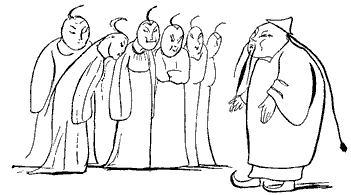That true Jihad is not the Jihad that the Western media talk about. Islamic Jihad has been redefined for us as an ugly hateful and scary ideology that the civilized world must eliminate. And, as some Islamophobes propagate, if eliminating all Muslims is the price needed to eliminate Jihad, it is a small price to pay to save the Civilization of Mankind.
I, and 99.99% of Muslims in the world, have not done anything that helped tarnish the meaning of the word Jihad. But I am certain we do not do enough to restore the word to its real glory either. Many Muslims have legitimate grievances against Israel, former and current colonial powers, international media, international religious bodies, .. etc, etc. Many of us, though, have little experience in presenting our cases and causes in a way that is conventional and accepted by centers of power in the world. We are even miserably less experienced in communicating with the average person in Europe and North America, where public opinion has serious impact on the decision making of current super powers.
Many of us take a 'defiant oppositional stance' that alienates many of the non-Muslims that could be our allies in straightening the record, and in addressing the grievances that Muslims legitimately have.
Learning the skill of cross-cultural communication is probably the single most important goal that good Muslims should aspire too to help the cause of Islam.
This is not an innovation into Islam. This is a directive that God has made as part of the Quran over 1500 years ago:
Wisdom, good exhortation, speaking in kindly manner, and repelling evil deeds with good ones have been the eternal advice by God that many, even most, of us have not followed closely with sad consequences for all of us.
- "CALL THOU (all mankind] unto thy Sustainer's path with wisdom and goodly exhortation, and argue with them in the most kindly manner ..." (Ch 16.125)
- "AND TELL My servants that they should speak in the most kindly manner [unto those who do not share their beliefs] ..." (Ch 17.53)
- "But [since] good and evil cannot be equal, repel thou [evil] with something that is better - and lo! he between whom and thyself was enmity [may then become] as though he had [always] been close [unto thee], a true friend!" (Ch 41.34)
Many of us accuse the West of double standards when they judge Arab and Muslim causes - a legitimate charge in many cases. But we rarely look at the way we judge issues ourselves. Many of us are profoundly guilty of the same thing we accuse the west of: having double standards. Yet we do not easily and willingly identify it in our own behavior and the behavior of other Muslims. It is not healthy to scream loudly to complain of what many of our own practice with our complicit approval, attempts at justification, or at best benign negligence.
Speaking up against our own for injustices they commit is an Islamic duty. God is very explicit in enjoining us to stick to one standard: upholding truth and justice no matter who is at fault:
For those who are still reading, it is about time to know what any of this has to do with re-redefining Jihad by a Jew.
- "... Be ever steadfast in your devotion to God, bearing witness to the truth in all equity; and never let hatred of anyone lead you into the sin of deviating from justice. Be just: this is closest to being God-conscious..." (Ch 5.8)
- "... when you voice an opinion, be just, even though it be [against] one near of kin..." (Ch 6.152)
- "... Be ever steadfast in upholding equity, bearing witness to the truth for the sake of God, even though it be against your own selves or your parents and kinsfolk." (Ch 4.135)
while doing my daily world newspaper tour I came across this title in the Israeli newspaper Haaretz:
He is actually, and simply talking about Jihad the way it was meant to be in the glorious days of Islam "... [as it] has been used in the Koran in its root meaning, i.e. to strive and to strive for betterment of society, to spread goodness (maruf) and contain evil (munkar)."
I would not quote every great sentence in the article, otherwise I will be quoting a lot. I promise you this: you will feel a lot better after you follow the link at the end of this posting and read the article in its entirety.
A Jewish Journalist embracing Jihad in the pages of the major Israeli Newspaper ... How did this happen?
Simply he came a across two Muslims who followed the teachings of the Quran that I mentioned earlier:
First, use wisdom when presenting you case and,Bradley Burston simply came across an article (see link below) by Asghar Ali Engineer explaining true Jihad, and how different it is from what some violent Muslims claim it to be. He also came across a Muslim, Peter Dames, commenting on the latest violence between Arabs and Jews in Akre, Israel, during the cerebration of Yum Kippur.
Second, be fair in judging the world: you own and the others.
Peter Dames wrote:
"As a man who practices Islam, I have to say both sides ought to be ashamed of themselves. Why are you committing such crimes? In the name of religion? No, I don`t think so, because God-fearing men contemplate God throughout their day.Wouldn't it be great if we read more articles by non-Muslim journalist embracing Jihad? Or at least using the the word the way it was meant to be? Unfortunately, this is not going to happen until we have a lot more Muslims embracing Jihad the right way, communicating their understanding to non-Muslims the right way, and applying justice using the same standards accross the board.
This has got to end. We are children of Abraham - not children of Satan. People, wake up! Monotheism is under attack because of such actions. Let not ignorance prevail over your emotions but rather let your intellect achieve peace, love, stability & closeness to God. Let's stop pointing fingers. Let's forgive and forget and live for the future for the sake of our children. Salaam/Shalom/Peace everyone. - Petere Dames"
It is about time to 're-redefine' Jihad.
Khaled
Links:
Read Bradley Burston's article here:
This year, this Jew is embracing Jihad - by Bradley burston in Haartez.
Burston is one of my favorite journalists of the Israeli daily Haaretz. I may not always agree with him, but he rarely talks like an ideologue and, mostly, the reader feels he thinks of the issue at hand, then decides how he should react and what to write about it. No foregone conclusions, and no prejudging.Also, check the article that moved him to writing the article listed above:








 I believe that my role on this blog [the St. Louis Post Dispatch Civil Religion blog] is to try to present what an American Muslim sees in his religion and how it interacts and coexists with other religions and belief systems. I made it clear from the beginning that I expect it will to be difficult to stay away from politics. It did not take a lot of brains on my part to expect that. I will continue to shy away from explicit political arguments, but it is impossible to avoid it totally as you may have guessed if you have read some of my latest postings and responses to comments by one reader (
I believe that my role on this blog [the St. Louis Post Dispatch Civil Religion blog] is to try to present what an American Muslim sees in his religion and how it interacts and coexists with other religions and belief systems. I made it clear from the beginning that I expect it will to be difficult to stay away from politics. It did not take a lot of brains on my part to expect that. I will continue to shy away from explicit political arguments, but it is impossible to avoid it totally as you may have guessed if you have read some of my latest postings and responses to comments by one reader ( I woke up early Friday morning to our house shaking. Realizing it was not in a tornado or something that required an immediate evacuation, I thanked God for the safety we were in and tried to go back to sleep. But this strange question popped up in my mind: Were there any gay parade scheduled in a near by city?
I woke up early Friday morning to our house shaking. Realizing it was not in a tornado or something that required an immediate evacuation, I thanked God for the safety we were in and tried to go back to sleep. But this strange question popped up in my mind: Were there any gay parade scheduled in a near by city? Religious people feel a strong connection with God. A personal and warm sense of proximity to our creator gives many of us comfort, strength, and enough boost to carry on when the going gets tough. Some people, unfortunately, get a bit too close.
Religious people feel a strong connection with God. A personal and warm sense of proximity to our creator gives many of us comfort, strength, and enough boost to carry on when the going gets tough. Some people, unfortunately, get a bit too close.


